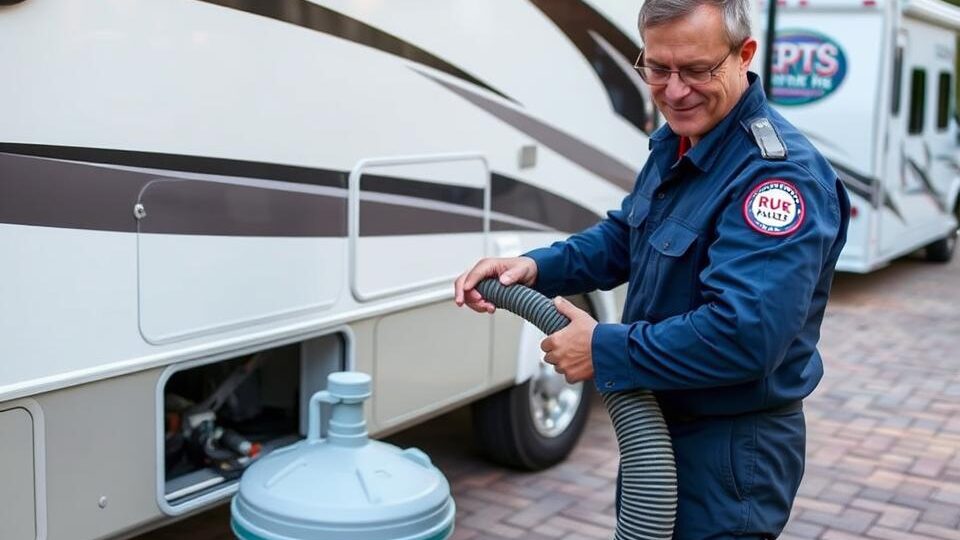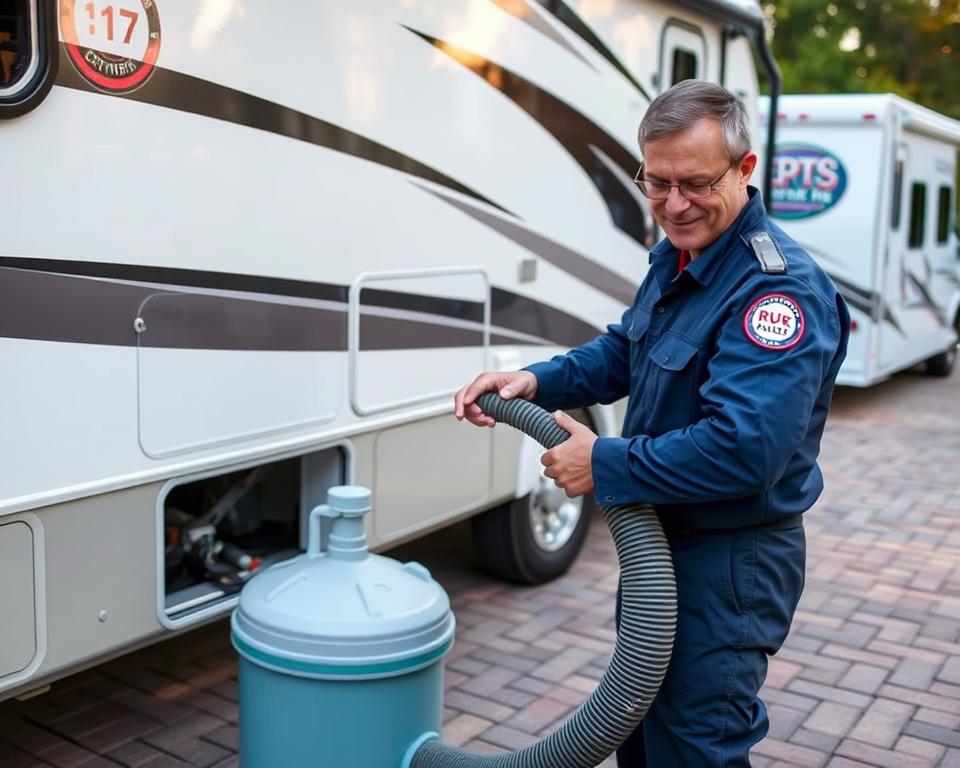
Cost Analysis of Shaver Lake Mobile RV Septic Service
Recreational Vehicle Septic Pumping: Your Guide to Hassle-Free Dumping
Have you ever pondered about your RV’s waste management during outdoor getaways? RV septic pumping is crucial, more than you might suspect. Ensuring your rig’s sanitation system functions properly is essential for smooth travel. This guide explains RV waste systems, why tank emptying is necessary, and top tips for stress-free excursions. With RV tank pumping services from All in Sanitation, you can focus on exploring, not emptying tanks.
Highlight Reel
- Knowing your RV’s waste system matters greatly for effective septic service.
- Regular septic pumping prevents unpleasant surprises during your travels.
- Implementing good routines boosts your RV’s sanitation durability.
- Rely on All in Sanitation for dependable RV waste solutions.
- Monitoring tank levels guarantees a smooth RV adventure.
- Proper wastewater disposal is key to responsible RV ownership.
Understanding RV Waste Systems
On-the-go waste setups in RVs play a vital role in sanitation. They include black and gray water tanks. The black tanks collect toilet waste. Gray water tanks manage dish and shower runoff. Knowing their operations improves waste management in your RV.
Proper upkeep of these components is crucial. Neglecting scheduled emptying can cause clogs. Potentially ruining your outdoor excursions. Ensure regular checks to keep both tank types functioning well.
Relying on a reputable black water provider ensures correct dumping. Also, treatments tailored for RV systems can prolong tank life and avert bad smells. Proper care of your waste system boosts your RV experience significantly.
Why You Need Regular RV Septic Service
Regular RV septic pumping is vital for the hygiene and functionality of your motorhome. Ignoring tank emptying can cause odors, clogging, and costly repairs. Accumulated waste poses health risks from bacteria. Keeping up with maintenance is thus crucial.
Using a professional service like All in Sanitation ensures eco-friendly waste disposal. Their expertise guarantees safe, efficient handling of your waste. Regular septic system care prolongs your travel joys without waste concerns. It ensures your road trips remain enjoyable, avoiding the dangers of overlooked RV septic pumping.
How Often Should You Pump Your RV Septic?
The frequency of RV septic pumping is critical for proper waste management. Regular timing avoids travel interruptions. Several factors affect how often you should pump: the number of people using the RV, tank size, and usage frequency.
If you camp sporadically, consider emptying black water tanks every few days. Full-time RV dwellers might need to pump more often due to more waste. Monitoring tank levels closely can improve your maintenance routine significantly.
Using tank treatments helps you gauge emptying times. By adhering to these disposal recommendations, RV owners can effectively safeguard their systems. Preventing tanks from overflowing not only keeps your environment clean but also prolongs the plumbing lifespan of your RV.

Methods for RV Septic Pumping
RV owners have multiple dumping methods at their disposal. The macerating method employs a macerator pump creating a slurry for easier disposal. This facilitates easier disposal at dumping stations or designated areas. Its efficiency and convenience make it a popular choice.
Residential dumping routes your RV waste into your home septic. Check local rules to ensure lawful dumping. Properly executed, it’s eco-friendly and compliant.
Gravity-fed dumping relies on height difference to empty tanks. All dumping options have advantages and drawbacks. Knowing the differences helps you pick the right approach for clean and efficient disposal.
RV Septic Pumping Equipment and Tools
Proper equipment makes tank emptying easier. A top-notch sewer hose is vital for connecting your RV’s waste tank to the dump station. Flexibility and strength are crucial qualities. A good sewer hose simplifies waste disposal, making it less of a hassle.
Macerator pumps are also essential in the equipment lineup. These devices liquefy solid waste into a fine slurry, facilitating smoother transfers. Ideal for low-lying dump points.
It’s crucial to maintain your RV septic pumping gear. Always clean hoses and tools post-use to avoid contamination. Storing them neatly ensures they’re always ready for use. Taking care of your equipment guarantees hygiene and efficiency during disposal tasks.
Top Tips for RV Sewer Maintenance
A tidy waste setup makes camping more enjoyable. To ensure this, it’s important to adopt best practices for RV sewer cleaning. Dump black tanks before gray to optimize rinsing. Gray water flushes residual solids, keeping lines clear.
Choose enzyme or bacterial additives for superior breakdown. They maintain a balanced microbial ecosystem in your tanks. Avoid bleach or strong cleaners that harm your septic’s helpful microbes.
Regular rinsing prevents odor and debris buildup. Use separate hoses for black water to reduce contamination risks. This habit enhances overall sanitation hygiene.
To ensure best practices are consistently followed, adhere to this checklist:
- Follow the black-then-gray dumping order.
- Incorporate bio-additives often.
- Steer clear of caustic cleaners.
- Rinse tanks, hoses, and connectors after every use.
- Perform periodic system inspections to spot problems.
Following these steps, RV owners can improve the life span and functionality of their wastewater systems. This leads to more enjoyable road trip experiences.
Upkeep for Trailer Septic Systems
Similar to RVs, mobile homes need regular septic care for lasting performance. Regular upkeep prevents expensive repairs and guarantees a working septic system. It is recommended to pump the tank every three to five years, depending on how much you use it and its size.
Effective disposal methods are key to maintaining your septic system. Make sure to dispose of all waste and chemicals properly. To reduce damage, use biodegradable products and keep an eye on tank levels. Steer clear of damaging cleaners that kill beneficial bacteria.
Arrange periodic expert check-ups to spot issues before they escalate. Proactive inspections maintain seamless functionality. Adhering to these maintenance tips will ensure the septic system of your mobile home remains in excellent condition.
Trailer Wastewater Disposal Tips
Effective trailer wastewater disposal is essential for a smooth RV experience. Locate approved dumping spots before departure. Verify legal compliance to prevent penalties and eco-harm. Using camper-safe solutions boosts tank health and dumping ease.
Flushing with clean water helps clear tanks completely. Flushing tanks with water ensures complete emptying, averting the risk of waste residue. Residual waste leads to smells and clogs. Moreover, it supports an eco-friendly disposal method.
Plan ahead for worry-free dumping. Scheduling dump stops around your itinerary streamlines the process. Coordination makes emptying more efficient. Some useful tips for waste disposal include:
- Keep tabs on gauges to predict emptying times.
- Use bio-additives to accelerate breakdown and maintain tank health.
- Protect yourself with gloves and sanitization after handling equipment.
What You Need to Know About Holding Tank Treatments
Efficient waste management in motorhomes relies heavily on proper RV holding tank treatment. Formulations contain targeted microbes and enzymes. They aim to break down waste effectively. Using them regularly stops bad odors and ensures tanks stay clear, boosting overall performance.
Adding bio-treatments fosters a healthy septic ecosystem. Speeding up breakdown reduces tank buildup. Less frequent emptying prolongs service intervals.
When selecting an RV holding tank treatment, consider your motorhome’s requirements. Treatment options range widely. Eco-friendly options that work well with home septic systems are best. They ensure efficient waste processing and enhance your RV’s waste management system.
| Type of Treatment | Key Components | Benefits |
|---|---|---|
| Liquid Formulas | Bio-catalysts | User-friendly; powerful decomposition |
| Powdered Solutions | Enzymes | Budget-friendly; durable |
| Compressed Tablets | Compressed bacteria | Hassle-free; exact dosing |
Common Mistakes to Avoid During Pumping
Many RV owners make errors during septic pumping that complicate waste management. A frequent oversight is not adhering to a routine pumping schedule. This leads to a quickly filling tank and subsequent issues. Additionally, the incorrect use of chemicals can damage the septic system. This often results in expensive repairs due to the disruption of system operations.
Dumping tanks out of sequence is a typical error. Black-then-gray order matters most. Reversing the order invites leaks and smells. It’s also vital not to open the septic tank access lids during home dumping. Leave complex dumping tasks to experts for safety.
Ignoring tool upkeep invites equipment failures. Properly maintaining hoses and other essentials ensures an efficient and sanitary RV sewer cleaning process. Awareness of these potential errors can streamline waste management. And keeps campsites fresh and hygienic.
Last Word
Comprehensive septic manuals are indispensable for RV enthusiasts. They pave the way for hassle-free travels. Consistent care and system knowledge boost your adventure quality. Employing correct methods and gear ensures stress-free camping.
Partnering with All in Sanitation brings peace of mind. Their skilled team manages waste with precision and care. Allowing you to focus on memories, not maintenance.
Routine tank emptying is fundamental to conscientious camping. It merges adventure with an odor-free, clean campsite. Ensuring every road trip remains clean and enjoyable.